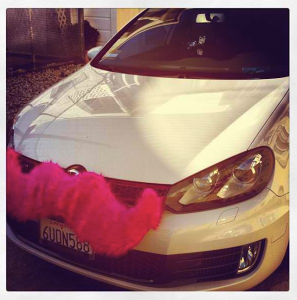CPUC’s Marzia Zafar told KQED’s Katrina Schwartz, “We want to make sure that these new companies provide accessible transportation for the disabled community. So we've put in some rules and regulations to ensure that the disabled community is not left behind if this new mode of transportation begins to grow rapidly.”
The rules would require ride-share companies to provide incentives to attract specially-outfitted vehicles to their fleets and report annually on the demand for them.
Sunil Paul, CEO of Sidecar, told KQED News that his company will be able to comply with the new regulations: “We’ve recently made a number of usability fixes for visually impaired passengers, based on feedback from blind and low-vision app testers. We hear from our riders all the time that one of the reasons they love ride-share is that they can get a ride from Sidecar in parts of the city where cabs are not available. And we'll continue our efforts to expand ride-share to underserved and disabled users.”
Lyft co-founder John Zimmer said, "We have always had accessibility issues in mind in the way engineers build our technology. It is in line with the core values of our company."
As for serving poor neighborhoods, Zimmer added, "We are doing everything we can to make sure we are serving as much of the population as possible."
Another key aspect of the proposed new rules is that CPUC has decided that the "voluntary reimbursements" for costs that Lyft and Sidecar riders pay to drivers (according to suggested amounts inside the app) are actually revenue earned by the drivers (and the companies, which take a percentage).
We asked Paul whether this will alter the company’s business model.
“It doesn’t. We built our business on the principles of ride-share. Our drivers love that they can drive when they want and that they have the ability to make some cash on the side. This helps them cover the cost of owning a car or pay off student loans or even realize a dream like starting a new business.”
Zimmer said Lyft already issues 1099K forms to drivers who earn above the IRS threshold as drivers, so this part of the CPUC rules will not affect his company's operations at all.
Probably the most recognizable TNCs on the streets of San Francisco and other cities are Zimmer's Lyft cars, which sport bright pink mustaches, known as Lyftaches. These were widely considered a clever marketing gimmick, but now the CPUC is proposing to make such identifiable symbols mandatory for TNCs:
"TNC vehicles shall display consistent trade dress (i.e., distinctive signage or display on the vehicle) when providing TNC services. The trade dress shall be sufficient to allow a passenger, government official, or member of the public to associate a vehicle with a particular TNC (or licensed transportation provider). Acceptable forms of trade dress include, but are not limited to, symbols or signs on vehicle doors, roofs, or grills. Magnetic or removable trade dress is acceptable. TNC shall file a photograph of their trade dress with the Safety and Enforcement Division."
One thing neither Sidecar's Paul nor Lyft's Zimmer could confirm were news reports that some ride-share drivers have been arrested by airport police at SFO. Both execs said they know of no such arrests that have occurred to date.
